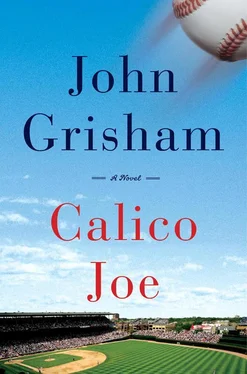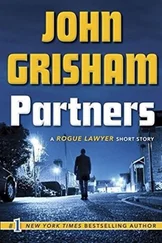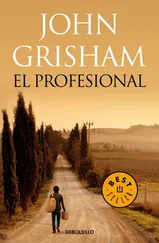He wasted no time in causing trouble. When Joe dug in in the bottom of the first, Marichal’s first pitch was aimed directly at his shoulder. Joe hit the ground and barely missed being maimed, and Wrigley almost exploded. From the Cubs dugout, there were shouts, threats, lots of cursing at the mound, where Marichal rubbed the baseball, smiled, and considered the next pitch. As a rookie in his fourth game, Joe knew it was not the moment to charge the mound. He had to earn that right, and it would happen soon enough. Keep your cool, his brother Red had advised him. They’ll start throwing at you before long.
The next pitch was a fastball, and Joe, swinging from the left side, ripped it down the right field foul line, a screaming bullet that froze the defense and stunned the crowd. The ball was clearly foul, but it kept rising and rising until it landed high in the upper deck. The pitch had been outside by six inches and was traveling at something close to ninety-five miles an hour, and Joe had easily yanked it foul. Marichal was impressed. Willie McCovey took a step back at first, and Joe noticed this. The third pitch was a fastball inside. Joe broke with the delivery, his bat trailing. Marichal was at the end of his theatrical delivery and in no position to field a bunt. McCovey got a bad jump. Tito Fuentes raced to cover first, but to no avail. The ball rolled through the baseline chalk for forty feet, then bounced slightly to the left. When McCovey picked it up, Joe Castle was sprinting past first base, now fourteen for fourteen.
McCovey said nothing to the kid. When the crowd settled down, Marichal stepped onto the rubber and looked at Dave Rader behind the plate. He went into his stretch, kicked high, as always, and Joe was halfway to second by the time Marichal released the ball. Rader’s throw to Fuentes was perfect, but much too late. After a leisurely slide into second, Joe bounced to his feet, looked at Marichal, shrugged, smiled, and spread his arms as if to say, “You throw at me, I’ll make you pay.”
Two pitches later, he stole third, then scored on a passed ball.
In the bottom of the fourth, he blooped a single to shallow center for his fifteenth consecutive hit. Marichal then caught him leaning and picked him off first.
As Joe had predicted, they eventually got him out. In his sixteenth at bat, in the bottom of the seventh inning, Joe crushed a ball to deep center, and for a second it looked as if it were gone. But the center fielder, Garry Maddox, drifted back and back until he was on the warning track, then back some more until he was almost touching the ivy. Three hundred ninety-nine feet from home plate, Maddox caught the ball, and the streak was over.
Joe was at second base, jogging, watching Maddox, and when the out was final, he turned and headed to the dugout. The crowd rose again in thunderous applause, and Joe took his time leaving the field.
After the game, the Cubs announced that his jersey would be changed. Number 42 was set aside, and for the remainder of his brief career Joe Castle wore Number 15.
* * *
The following Thursday, the Mets began a four-game home series against the Cardinals that was a run-up to the All-Star Game. Of course I knew the pitching rotation. My father was scheduled to get the ball Thursday night, and I wanted to be at Shea Stadium.
Thursday afternoon, before he left for the game, we managed to talk a little baseball. As usual, he was preoccupied and going through his pregame jitters. He was aloof on most days, but when he was about to pitch, he was so distant I wondered if he actually heard my voice. He was thirty-four years old and trying desperately to make something of his declining career. Looking back, I’m sure he was frightened at the prospect of aging out of baseball. The years were slipping by, and the great Warren Tracey was proving to be not so great after all. In the Mets rotation, he was the fourth man behind Jon Matlack, Jerry Koosman, and the incredible Tom Seaver. As the teams headed into the All-Star break, his record was four wins and six losses, and his earned run average was a bloated 5.60. The New York sportswriters were demanding a new fourth man. The Mets were two games under .500 and apparently going nowhere.
“Congratulations on making the All-Star team,” he said. We were on the patio, in the shade, drinking milk shakes. He had a banana shake, one he made himself, precisely six hours before he took the mound, one of his little quirks. All baseball players, especially pitchers, have them, he once told me, so I started looking for a quirk.
“Thanks. We’ve been practicing every day this week. First game’s Saturday against Rye at two o’clock.”
“Sorry I can’t make it.” The Mets played at the same time Saturday, so both of us would be happy. He wouldn’t be at my game, and I wouldn’t be at his. “You gonna pitch Saturday?” he asked.
“I doubt it. Right now I’m number two behind Don Clements. He’s twelve.”
He couldn’t have cared less. He sipped his milk shake and gazed across the lawn, lost in his own world. I really couldn’t blame him. On the days I pitched, I thought of nothing else. I could not imagine how nerve-racking it must be to walk to the mound at Shea Stadium in front of fifty thousand fans and perform.
“What about this Joe Castle guy?” I asked.
He snorted his disapproval. “Not a bad start, but these guys flame out. Once or twice around the league, and we figure them out. Every rookie’s got a hole in his swing. Sooner or later, we find it.”
He seldom said nice things about other players, even his own teammates. At the age of eleven, I thought this was odd, but it would take a few years to understand that he was so insecure about his own game he could rarely admire that of another player.
“Wait until he starts seeing the hard slider,” he said, his words trailing off as his mind drifted away.
I wasn’t going to argue or cause trouble. I was just thrilled to be talking baseball with my father. “Not a bad start”? After seven games, Joe had twenty-four hits in thirty-one at bats, with nine home runs and nine stolen bases.
“Say, Dad, I would like to see you pitch tonight. I’ll take the train in and stay out of the way. Tom can come with me.”
He frowned and took another sip.
It would be safe to assume that the son of a player would have all sorts of perks, including pregame passes on the field, locker room clearances, and, of course, access to tickets. It did not work that way with Warren Tracey. He did not want me hanging around and often complained about other players who let their kids crawl through the dugout before game time. He considered this to be highly unprofessional. To him, the turf was sacred ground, and only those in uniform should be allowed to step on it. He flatly refused to speak with any reporter on the field before a game because, in his opinion, the press should be confined to the press box.
“I’ll see what I can do,” he finally said, as if this were some great favor. My mom would not allow me to ride the train alone, so I had invited Tom Sabbatini.
“I guess your mother’s not going to the game,” he said.
Talk about a volatile subject. My mother went to a few games each season—as few as possible. We sat with the other Mets families, and I knew some of the players’ kids, though we were not friends, because no one else lived in White Plains. My mother refused to socialize with the other wives, and it was many years before she explained why. My father chased women—on the road, at home, in spring training, whenever, wherever, it didn’t matter to Warren. My mother knew this, though I’m not sure how she knew. As with every professional baseball team, there were players who fooled around and others who did not. I don’t know the percentages, and I doubt if a reliable study has ever been undertaken. Who really wants to know? As my mother explained to me years later, all the wives knew the reputations of the philanderers, and it was safe to assume that every Mets wife knew Warren Tracey could not keep his pants on. She felt humiliated sitting in the section for the players’ families with Jill and me and trying to pretend we were just another happy family.
Читать дальше











